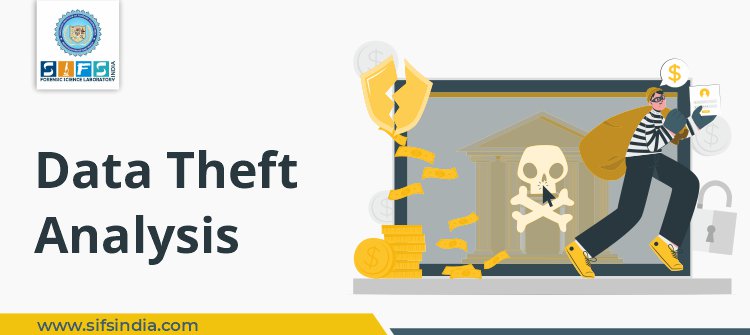Data theft is the act of stealing sensitive, secured, and confidential information by cybercriminals with the intent to breach your privacy.
Data theft analysis forensic support services involve a comprehensive analysis of digital evidence to identify, trace, and mitigate incidents of data theft. It comprises an examination of computer networks, credit card breaches, malware outbreaks, data breaches, and various other cyber crimes and complexities related to them.
You must hire professionals with expertise in digital forensics and cybersecurity and a commitment to contributing to safeguarding digital assets.
SIFS India offers expert support in analyzing digital devices, networks, and servers to trace the origins of data theft incidents. The experts examine digital evidence like log files, system metadata, compromised data, etc. to identify tactics used by cyber criminals to gain unauthorized access and provide recommendations for enhancing cyber security measures to prevent future breaches.
Services Our Organization Provides:
Social Engineering Detection and Analysis: It involves detecting and analyzing deceptive tactics employed by cyber criminals to target individuals and organizations.
Lost Data Restoration: Advanced techniques are used to recover critical information and minimize the impact of data loss incidents on businesses and individuals.
Webcam and Net Banking Scams Analysis: It involves a thorough analysis of malicious activities like identity theft, fake emails, fake job offers, etc. used by criminals.
Disaster Recovery Management: It includes implementing strategic disaster recovery plans to mitigate the impact of unforeseen incidents and ensure efficient recovery of data and systems to maintain business continuity during cyber or natural disaster scenarios.
Hard Drive Cloning: We securely duplicate hard drives to create identical copies to preserve crucial digital evidence for forensic investigations.
Examination of Attacks, Viruses, Worms, etc.: We do in-depth forensic examination of various cyber threats, including attacks, viruses, and worms, to identify their origin, impact, and patterns.
Cyber Spying: Specialized techniques are used to detect and prevent cyber spying activities to safeguard the privacy of individuals and organizations.
Employee Working Monitoring: It involves monitoring employee activities within an organization ethically to detect and mitigate potential insider threats and unauthorized access.
Data Backup Management: It includes implementing strategies to ensure a regular backup of critical information to prevent data loss and efficiently recover data in case of cyber incidents.
Emails’ Source and IP Address Identification: A thorough analysis is done to trace the source and IP addresses of emails to identify potential threats or unauthorized access.
Web Penetration Testing: It involves testing web applications to identify vulnerabilities and strengthen online security measures against cyber attacks.
Incident Response and Management: It involves developing strategies to effectively handle cyber incidents to minimize damage, analyze the scope of the incident, and implement preventive measures for the future.
Solid Web Application Security Program Execution: It includes implementing robust web application security programs to secure online platforms against potential threats.
Detection of Attackers: Advanced techniques are used to identify and track cyber attackers for legal purposes and to strengthen cyber security measures to minimize future attacks.
Weak Passwords Detection: Weak passwords are analyzed, and strong authentication practices are implemented to prevent unauthorized access through compromised credentials.
Identity Protection Solutions: It involves designing solutions to protect personal and organizational identities, like measures to prevent identity theft, unauthorized access, and the compromise of sensitive information.
Blacklisted Search Engine Analysis: A thorough examination of blacklisted search engines is done to identify potential threats, prevent access to malicious content, and ensure a secure online browsing experience.
Denial of Service Attack Analysis: A thorough analysis is done to understand the patterns and origin of the attack and implement countermeasures to reduce its impact on networks and system availability.
Malware and Spyware Analysis: In-depth examination is done to identify the origin and potential impact on users and develop methods to minimize the chances of unauthorized access to users’ devices.
Mobile and Related Devices Examination: A forensic examination of mobile devices and related technologies is done to identify and mitigate potential security threats.
Data Loss Protection Solutions: This includes implementing strong protective measures to safeguard sensitive information from unauthorized access or accidental deletion.
Mobile Devices’ and Hard Drives’ Encryption Implementation: It includes implementing encryption protocols for mobile devices and hard drives to enhance the security of the stored data and reduce the risk of unauthorized access.
Email Authentication on Server and in Backup Files: It involves ensuring secure email communication through server and backup file authentication to safeguard sensitive information against email-based threats and unauthorized access.
Anti-Virus and Anti-Spam Software Updation: Regular updating of anti-virus and anti-spam software is done to provide continuous protection against malicious software and to stay ahead of evolving cyber threats.
Data Leak Penetration Examination: In-depth analysis is done to identify potential data leaks and vulnerabilities that can help organizations upgrade their systems and prevent sensitive information.
Keylogger Detection: It involves safeguarding the unauthorized capture of keystrokes to protect sensitive data from potential breaches.
Permit 2-Factor Authentications: This is done to enhance access security and ensure an additional layer of protection against unauthorized access attempts.
Email Data Protection: Protective measures like encryption, secure backup, and authentication protocols are implemented to secure email communication against potential security threats.


